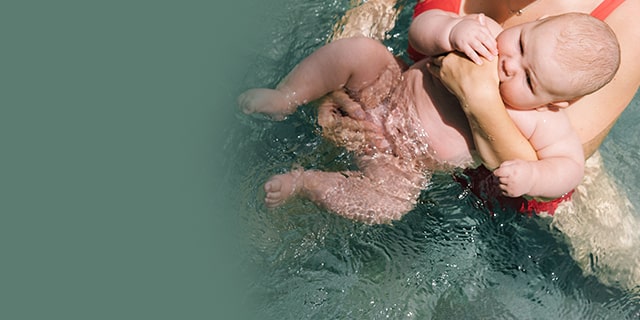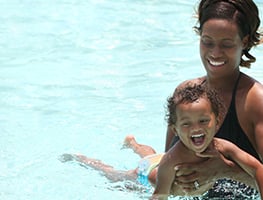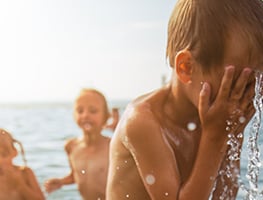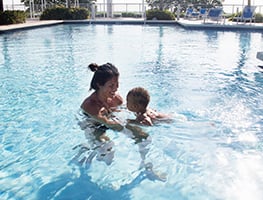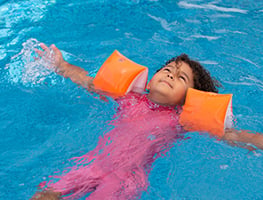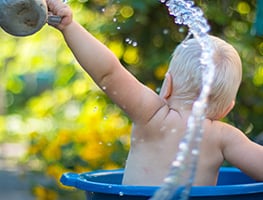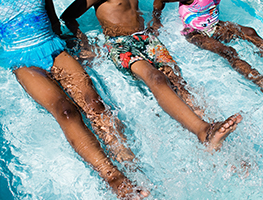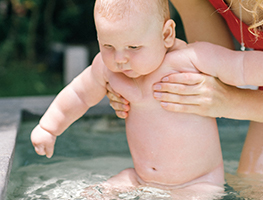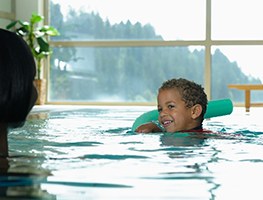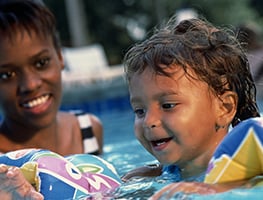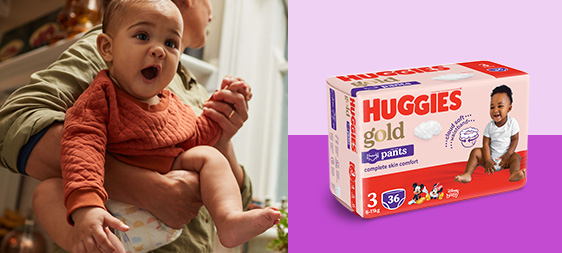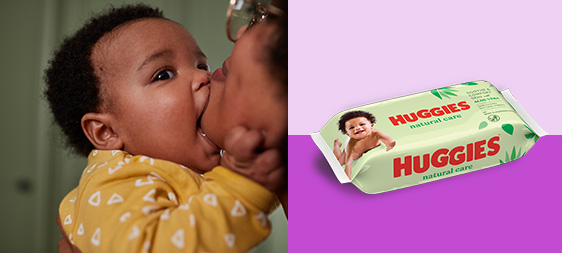Swimming lessons, and the resulting ability to swim, are something that will benefit every child for their whole life. In the early years, the primary advantage is obviously one of water safety but, in the longer term, benefits include improved fitness, balance, co-ordination and increased self-esteem.
With professionally trained instructors and a safe learning environment, swimming lessons are a great way to get your kids water-wise, and let them have fun with other kids their own age.
A good swimming instructor will encourage respect for the water and will develop your child’s confidence in and around the water. This becomes the foundation for children to enjoy the many recreational and sporting activities that involve water in South Africa.
According to the Statistics South Africa, 5% of accidental deaths in under-5 year olds are due to drowning. That’s why it’s imperative to teach your children general water safety and swimming skills, especially if you live near open water or have a pool.
How to learn to swim
Learning to swim is a process that can start at birth. Getting your child used to being in water at bath time can be fun – for the kids and for you! Many children learn to swim before they can walk and the sooner they start, the better.
How you choose to teach your children to swim depends mainly on their age. As a broad rule-of-thumb:
Under 6 months, babies can become familiarised with water at bath time
First lessons can start from around 6 months old, and are generally fun exercises with parents to get the child used to the water
3 to 4 year olds can start with “formal” lessons, learning the swimming strokes like freestyle, breaststroke and backstroke
When formal teaching does begin, there are plenty of options to choose from. The local public pool or pool at the gym are good places to start out; most run swimming programmes throughout the year for all ages and sizes. These programmes are usually group-based and need to be booked in advance, either by month or by term.
The option also exists to hire a private swimming instructor to provide one-on-one teaching, but this will obviously be more expensive and will lack the social element, especially when the children are younger and parents are involved.
In the following three sections, you will find more information on swimming for infants, toddlers and kids:
1. Infant swimming
Babies have been in the watery environment of the womb for nine months of pregnancy, so in these early stages, they generally have little fear of water – this fear is usually learned later in life rather than being instinctive – so early in life is an ideal time to start getting them used to being in the water. Showing them how to blow bubbles in the bath water, pouring small amounts of water over their heads and helping them “swim” around the bath on their tummies are some ways you can help your infant gain more confidence in the water.
When kids reach six months, they will be old enough to start lessons at the local pool, your gym or registered swim school. At this age, kids go into the pool with mom or dad and learn in small groups with a trained instructor.
2. Toddler swimming
From one to three years of age, most children are learning to walk and the toddler stage is a wonderful time for them to gain skills in the water as well. Swim South Africa recommends that until two or three years of age, children need a carer in the water with them. As a parent, nothing compares with seeing your child develop and become confident in the water, so take advantage of the lesson time to have fun with your child.
As swim lessons progress, the children will learn to move to the side of the pool and climb out of the pool on their own. Free floating and back floating are also introduced, as well as some basic kicking and arm paddling. Most children lack the fine motor skills to master “proper” strokes until the age of four years old.
3. Kids’ swimming lessons
From the age of four years old, children start developing their co-ordination and can be taught specific strokes like freestyle, backstroke and breaststroke. “Formal” lessons can begin at around three years of age when they are old enough to be in the water without mom or dad.
The essential prerequisites for formal lessons generally include:
Ability to move through the water – basic ‘doggie-paddle’ and leg kicking
Balance – knowing which way is ‘up’ allows them to find the surface of the water quickly
Submersion – putting the head under the water while holding their breath
Recovery – safely getting to the side of the pool
By the age of five, children should have the ability and confidence to swim in shallow waters on their own, but of course any swim time at this age should always be closely supervised by a parent or guardian.
Swimming lessons will give your kids an asset for life and let them enjoy all the activities and water sports we love in South Africa. Learning to swim is a process that should start from an early age and lessons are an important part of that process. As well as keeping your kids safe around the water, the lessons can be a fun time for parents too – even when your little ones are splashing you in the face or jumping on you from the side of the pool!
Swimming South Africa has the following water safety rules:
Learn to swim
Never swim alone
Do not swim at a river mouth
Never dive into unclear or shallow water
Do not play in swamps, on rocks or on river banks
Beware of animals like crocodiles and hippopotami under the water in rivers
Beware of swift flowing undercurrents
Check the depth of the water before going in
Have a rope, stick or inflatable lifesaver at hand to help someone in trouble
Children should always have adult supervision and permission to go swimming
For more information on swimming:
For more information on water safety:

